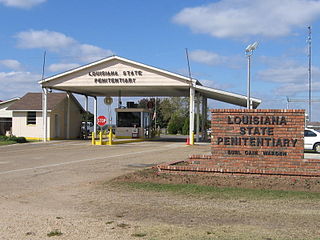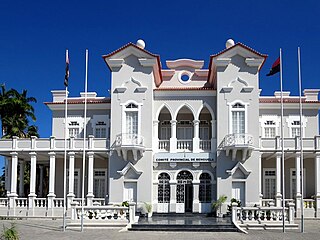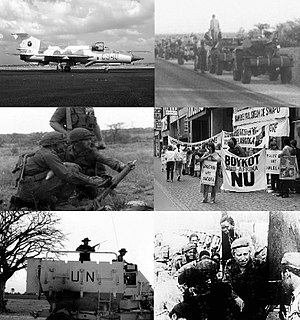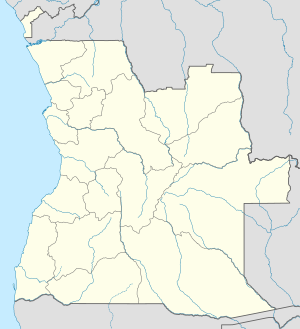
Angola, officially the Republic of Angola, is a country on the west coast of Southern Africa. It is the seventh-largest country in Africa, bordered by Namibia to the south, the Democratic Republic of the Congo to the north, Zambia to the east, and the Atlantic Ocean to the west. Angola has an exclave province, the province of Cabinda that borders the Republic of the Congo and the Democratic Republic of the Congo. The capital and largest city of Angola is Luanda.

The economy of Angola remains heavily influenced by the effects of four decades of conflict in the last part of the 20th Century, the war for independence from Portugal (1961–75) and the subsequent civil war (1975–2002). Despite extensive oil and gas resources, diamonds, hydroelectric potential, and rich agricultural land, Angola remains poor, and a third of the population relies on subsistence agriculture. Since 2002, when the 27-year civil war ended, government policy prioritized the repair and improvement of infrastructure and strengthening of political and social institutions. During the first decade of the 21st Century, Angola was one of the fastest-growing in the world, with reported annual average GDP growth of 11.1 percent from 2001 to 2010. High international oil prices and rising oil production contributed to strong economic growth, although with high inequality, at that time. Corruption is rife throughout the economy and the country remains heavily dependent on the oil sector, which in 2017 accounted for over 90 percent of exports by value and 64 percent of government revenue. With the end of the oil boom, from 2015 Angola entered into a period of economic contraction.

Luanda, is the capital and largest city in Angola. It is Angola's primary port, and its major industrial, cultural and urban centre. Located on Angola's northern Atlantic coast, Luanda is Angola's administrative centre, its chief seaport, and also the capital of the Luanda Province. Luanda and its metropolitan area is the most populous Portuguese-speaking capital city in the world, with over 8,3 million inhabitants in 2020.

Cabinda is an exclave and province of Angola, a status that has been disputed by several political organizations in the territory. The capital city is also called Cabinda. The province is divided into four municipalities—Belize, Buco-Zau, Cabinda and Cacongo.

The National Union for the Total Independence of Angola is the second-largest political party in Angola. Founded in 1966, UNITA fought alongside the Popular Movement for the Liberation of Angola (MPLA) in the Angolan War for Independence (1961–1975) and then against the MPLA in the ensuing civil war (1975–2002). The war was one of the most prominent Cold War proxy wars, with UNITA receiving military aid initially from People's Republic of China from 1966 until October 1975 and later from the United States and South Africa while the MPLA received support from the Soviet Union and its allies especially Cuba.

The People's Movement for the Liberation of Angola, for some years called the People's Movement for the Liberation of Angola – Labour Party, is a political party that has ruled Angola since the country's independence from Portugal in 1975. The MPLA fought against the Portuguese army in the Angolan War of Independence from 1961 to 1974, and defeated the National Union for the Total Independence of Angola (UNITA) and the National Liberation Front of Angola (FNLA), two other anti-colonial movements, in the Angolan Civil War of 1975–2002.

José Eduardo dos Santos is an Angolan politician who served as President of Angola from 1979 to 2017. As President, José Eduardo dos Santos was also the commander in chief of the Angolan Armed Forces (FAA) and President of the People's Movement for the Liberation of Angola (MPLA), the party that has ruled Angola since it gained independence in 1975. He was the second-longest-serving president in Africa, surpassed only by President Teodoro Obiang Nguema Mbasogo of Equatorial Guinea, who took power less than two months before dos Santos.

Angola is divided into eighteen provinces, known in Portuguese as províncias:

The Angolan War of Independence, called in Angola the Luta Armada de Libertação Nacional, began as an uprising against forced cultivation of cotton, and it became a multi-faction struggle for the control of Portugal's overseas province of Angola among three nationalist movements and a separatist movement. The war ended when a leftist military coup in Lisbon in April 1974 overthrew Portugal's Estado Novo regime, and the new regime immediately stopped all military action in the African colonies, declaring its intention to grant them independence without delay.

The Louisiana State Penitentiary is a maximum-security prison farm in Louisiana operated by the Louisiana Department of Public Safety & Corrections. It is named "Angola" after the former plantation that occupied this territory. The plantation was named for the African country that was the origin of many slaves brought to Louisiana.
The Angola national football team represents Angola in men's international football and it is controlled by the Angolan Football Federation, The team made its first appearance in 2006 FIFA World Cup, the team's nickname is Palancas Negras, The team is governing body of Football in Angola in the country, The team represents both FIFA and Confederation of African Football (CAF).

Benguela is a city in western Angola, capital of Benguela Province. Benguela is one of Angola's most populous cities with a population of 555,124 in the city and 561,775 in the municipality, at the 2014 census.

The Angolan Civil War was a civil war in Angola, beginning in 1975 and continuing, with interludes, until 2002. The war began immediately after Angola became independent from Portugal in November 1975. The war was a power struggle between two former anti-colonial guerrilla movements, the communist People's Movement for the Liberation of Angola (MPLA) and the anti-communist National Union for the Total Independence of Angola (UNITA). The war was used as a surrogate battleground for the Cold War by rival states such as the Soviet Union, Cuba, South Africa and the United States.

The South African Border War, also known as the Namibian War of Independence, and sometimes denoted in South Africa as the Angolan Bush War, was a largely asymmetric conflict that occurred in Namibia, Zambia, and Angola from 26 August 1966 to 21 March 1990. It was fought between the South African Defence Force (SADF) and the People's Liberation Army of Namibia (PLAN), an armed wing of the South West African People's Organisation (SWAPO). The South African Border War resulted in some of the largest battles on the African continent since World War II and was closely intertwined with the Angolan Civil War.
The Angolan national basketball team is controlled by the Federação Angolana de Basquetebol. Angola has been a member of FIBA since 1979. Ranking 23rd in the FIBA World Rankings, Angola is the top team of FIBA Africa, and a regular competitor at the Summer Olympic Games and the FIBA World Cup.

Miss Angola is a national beauty pageant in Angola. The pageant was founded in 1997, and has sent its winners to Miss Universe since its foundation. From 1998 to 2012, its first runners-up were sent to Miss World.

The People's Republic of Angola was the self-declared socialist state which governed Angola from its independence in 1975 until 25 August 1992, during the Angolan Civil War.

Portuguese Angola refers to Angola during the historic period when it was a territory under Portuguese rule in southwestern Africa. In the same context, it was known until 1951 as Portuguese West Africa.

The COVID-19 pandemic in Angola is part of the worldwide pandemic of coronavirus disease 2019 caused by severe acute respiratory syndrome coronavirus 2. The virus was confirmed to have spread to Angola in late March 2020, with the first two cases being confirmed on 21 March.
















